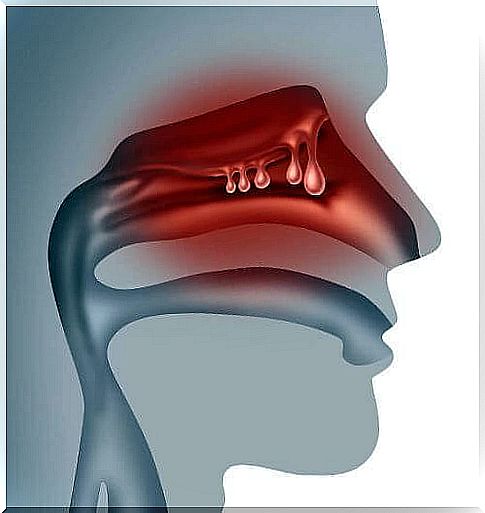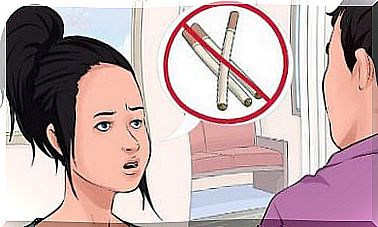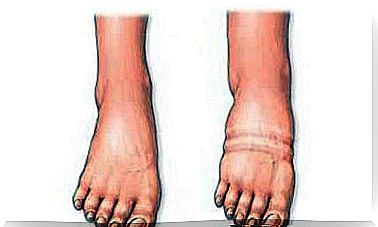Polyps In The Nose: Symptoms, Causes And Treatment

Nasal polyps are soft, bag-like growths in the lining of the nose or sinuses. This condition is most common in adults and very rarely in children under 10 years of age.
Experts estimate that nasal polyps occur in about 1 to 5% of the total population. They affect men and women more or less equally, although their incidence is slightly higher in men. They most often occur in people between 30 and 40 years of age.
This disease is considered a variant of sinusitis, more precisely, polypoid sinusitis. The size that nasal polyps can take varies greatly: they can be very small or become quite large. In most cases they do not cause any major problems, but in others they cause nasal obstruction.
What exactly are polyps in the nose?
Polyps in the nose, unlike polyps elsewhere in the body, are rarely a serious health problem. They are associated with cancer only in isolated cases, as will be confirmed by a biopsy. However, the vast majority of these changes are of a mild nature.
They occur in the nostrils and doctors generally consider them to be benign. Nasal polyps are whitish in color, with a soft texture, and often teardrop-shaped. Their appearance is similar to seedless peeled grapes. They appear in the nostrils or sinuses. They can be single or multiple.
Doctors consider them to be mild changes. Unlike polyps that appear in the bladder or colon, polyps in the nose are not tumors and present a minimal risk of cancer. They are usually caused by chronic inflammation, so doctors often associate them with asthma, immunodeficiency, allergies, etc.
These formations appear when the natural mucosa that is present in the nasal passages or sinuses overgrows. In such cases, the mucosa grows and becomes filled with a thick fluid. Gradually, this accumulation takes a certain shape, as a result of which polyps in the nose are formed. This condition is called nasal polyposis.
The reasons for this phenomenon
There is some controversy about the causes of nasal polyps. Traditionally, specialists have recognized that this process is related to some type of allergy, but there are similar cases in which the condition does not occur. Doctors also do not fully understand the evolution of this disease.

There is evidence that mucosal chemical markers and immune system responses differ between those who develop nasal polyps and those who do not. This suggests that certain genetic mutations may be involved in this issue.
In any case, scientists have established a list of conditions that act as risk factors for this disease. This list includes the following items:
- Asthma.
- Allergic fungal sinusitis.
- Cystic fibrosis.
- Sensitivity to aspirin.
- Vitamin D deficiency
- Churg-Strauss syndrome (eosinophilic granulomatosis with polyangiitis).
In some cases, polyps appear during the infectious process in the nose and then disappear as the infection clears. They also form when there is a foreign body in the nose.
Polyps in the nose – the most important symptoms
In many cases, polyps in the nose show no symptoms. However, if they enlarge, they can block the airways.
When polyps are small, they generally do not cause any symptoms and therefore usually go unnoticed. If they start to enlarge, they become noticeable and can cause discomfort or become a source of nasal obstruction.

Large polyps often cause sinus infection, which becomes a common symptom of polyposis. Often there is nasal congestion, some degree of loss of smell and taste, as well as runny nose, headache, nasal pain, and common cold signs.
In some cases, people with nasal polyps may have to breathe through their mouths. This is because there is an obstruction in the nasal passage that is blocking it to a greater or lesser extent. There are times when a polyp is even present in the nasal passages, so you can feel it with your finger.
Treatment methods
The most effective treatment for nasal polyps is extraction surgery. However, patients and doctors also tend to take other procedures to heal them before surgery, especially if they are not too much.
Most often, treatment is started with the administration of corticosteroids via nebulization into the nostrils or orally. Corticosteroids usually cause numerous side effects, therefore the doctor and the patient must be carefully monitored.
Doctors commonly use antihistamines and antibiotics. If the polyp is very large and causes some degree of obstruction, surgery is indicated. However, research has shown that polyps can regrow after this procedure. See your doctor to find out what to do in your specific case.








